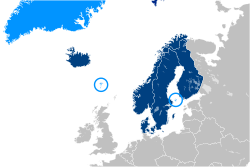Nordic Council Secretariat

Member states and regions of the Nordic Council (blue).
|
|
| Headquarters | |
| Largest cities | |
| Working languages | |
| Type | Intergovernmental organisation |
| Membership |
3 territories
|
| Leaders | |
|
|
|
|
• President of the Nordic Council
|
|
|
• Vice-President of the Nordic Council
|
|
|
• Secretary-General of the Nordic Council of Ministers
|
|
|
• Presidency of the Nordic Council of Ministers
|
|
| Establishment | |
|
• Nordic Council inaugurated
|
12 Feb 1953 |
|
• Treaty of Helsinki
|
1 Jul 1962 |
|
• Nordic Council of Ministers and Secretariat inaugurated
|
Jul 1971 |
| Population | |
|
• 2012 estimate
|
25,880,000 |
| Currency |
5 currencies
|
|
Website
www |
|
The Nordic Council is the official body for formal inter-parliamentary co-operation between the Nordic countries. Formed in 1952, it has 87 members from Denmark, Finland, Iceland, Norway and Sweden as well as from the autonomous areas of the Faroe Islands, Greenland and the Åland Islands. The representatives are members of parliament in their respective country/area and are elected by those parliaments. The Council holds ordinary sessions each year in October/November and usually one extra session per year with a specific theme.
In 1971, the Nordic Council of Ministers, an intergovernmental forum, was established to complement the Council. The official and working language of both the Nordic Council and the Nordic Council of Ministers is Scandinavian (Danish, Norwegian and Swedish), which is the first language of around 80% of the region's population and learned as a foreign language by the remaining 20%.
The Nordic Council and the Nordic Council of Ministers are involved in various forms of cooperation with neighbouring areas, amongst them being the Baltic Assembly and the Benelux, as well as Russia and Schleswig-Holstein.
During World War II, Denmark and Norway were occupied by Germany; Finland fought a costly war with the Soviet Union; while Sweden, though neutral, still felt the war's effects. Following the war, the Nordic countries pursued the idea of a Scandinavian defence union to ensure their mutual defence. However, Finland, due to its Paasikivi-Kekkonen policy of neutrality and FCMA treaty with the USSR, could not participate.
...
Wikipedia

